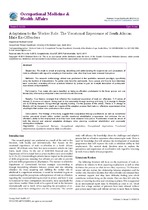Adaptation to the worker role: The vocational experience of South African male ex offenders
Abstract
Objectives: The study is aimed at exploring, describing and understanding the experiences and perceptions of
male ex-offenders with regard to adapting to their worker roles after they have been released from prison.
Methods: The research methodology utilised was positioned in the qualitative research paradigm, specifically
using the tradition of interpretivism. To gather data from the participants, focus groups and face to face interviews
were conducted, consisting of broad questions followed by probes to gain an in-depth description of participants’
experiences and perceptions.
Participants: Five males who were classified as being ex-offenders participated in the focus groups and one
female (key informant) participated in two semi structured interviews.
Results: Four themes emerged that reflected the vocational experience of male ex- offenders: 1) A sense of
distrust, 2) A sense of support: Giving back to the community through learning and doing, 3) A change in lifestyle
and 4) Working towards change through capacity building. For the purpose of this article, Theme 3- A change in
lifestyle, will be discussed in depth as it explored the adaptive process that male ex- offenders experienced when
adapting to their worker roles post release from prison.
Conclusions: The findings of the study suggest that occupational therapy practitioners as well as correctional
service personnel should utilise context specific vocational rehabilitation programmes that enhance the exoffender’s
ability to find employment once they have been released from prison. Practitioners should be aware of
both the internal and external adaptation strategies when planning vocational rehabilitation and community
reintegration strategies.

